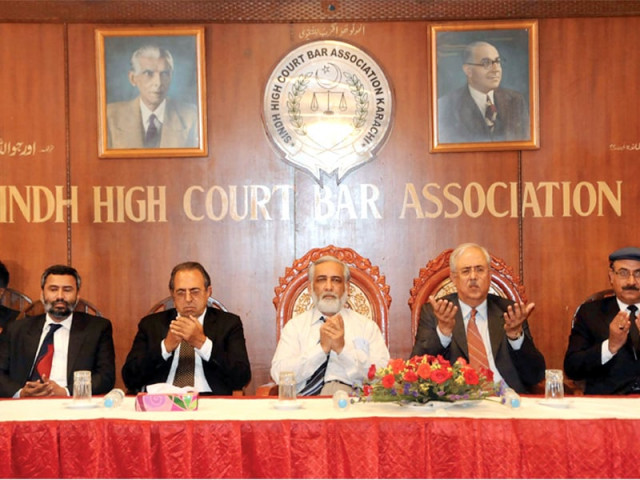May 12 mayhem: The courts can’t do a thing if the govt turns hostile, says CJ
On May 12, authorities told the SHC CJ that only bodies could enter the court.

For the anniversary of May 12, 2007, a day when at least 46 people died in pitched street battles, Sindh’s lawyers and judiciary picked the terribly appropriate theme of the rule of law and the duty of the government.
“The courts are equipped with moral authority alone and are devoid of administrative powers,” declared Chief Justice Mushir Alam. “They are rendered ineffective if the administrative authority (government) decides not to implement their orders.”
The seminar was organised by the SHC bar association in remembrance of the mayhem that broke out on that day five years ago. The Sindh High Court was besieged and people going to receive the then suspended Chief Justice of Pakistan Iftikhar Muhammad Chaudhry were ambushed on the streets. He was scheduled to come to Karachi to attend the golden jubilee programmes of the SHCBA.
CJ Mushir Alam said that he and other judges and lawyers were witness to the siege of the SHC by “sons of this city”. “We still remember that day and how we entered the SHC premises by scaling the wall of the highest court of the province.”
Sharing for the first time what happened in the chamber of the then chief justice of the SHC, Justice Sabihuddin Ahmed, he recalled how the late judge rang up an “authority”, informed him of the law and order breakdown in the city, the beating and threats to lawyers and that a larger number of lawyers at the city courts wanted to be able to make it to the SHC.
The personality on the other line said that if the SHC CJ and lawyers wanted to enter the SHC then only bodies could make it. “This left us all bewildered and aghast,” recalled Justice Mushir Alam.
He felt that this “conspiracy” and similar ones had plagued the country and nation since its inception. The most significant one was the “constitutional deviation” by the then governor general, Ghulam Muhammad. The chief court or the Sindh High Court in the famous Moulvi Tamizuddin Khan case set things right by issuing a “writ of quo warranto and writ of mandamus” but the then federal court overruled it all, squandering the independence of the judiciary in the process.
The intervening period (from 1954 to 2007) was not one which makes us happy, he went on to say. But after 2007, the act of refusal by CJP Iftikhar Muhammad Chaudhry has changed the atmosphere. “As a result of a joint movement by the lawyers, judges, civil society and the media, we [gained] a vibrant, pro-active judiciary and democratic dispensation but people have yet to reap the benefits of democracy.”
He said that despite all the pessimism there was hope that there would be absolute independence of the judiciary, rule of law and true democracy. The judiciary has decided to shun the “law of necessity”, refused to surrender before a tyrant and will not surrender in future too and the country and nation would emerge from the present low, he said.
The SHCBA’s president, Anwar Mansoor Khan, reiterated that the government had been duty bound to protect the lives and properties of the people and protect the courts on May 12. He referred to a recent statement made by the Sindh chief minister in which he was quoted to have said that government had a report about May 12 but would not make it public.
If the government is not controlling law and order, it means that it is involved in the violence, he said, concluding his speech.
On a more self-reflective note, Akhtar Hussain, the vice chairman of the Pakistan Bar Council, asked the members of the bar associations to first discipline themselves and subject themselves to self-accountability. He decried the role of political parties, saying none of them had an agenda for structural changes in the country. It was a misperception that the present government is a democratic one. “I call it an elected government and not a democratic government,” he said.
A number of resolutions were adopted at the end of the seminar calling upon the government to try and sentence the men who held the city and its people hostage on May 12, 2007 and killed innocent citizens and lawyers.
“The House is of the considered view that General Pervez Musharraf is involved in the mayhem of May 12, 2007, and therefore, he should also be tried for all such offences committed on that sad day,” the key resolution read.
Javaid Siddiqui of the Law Foundation, a senior lawyer respected widely for his principles, said: “Even the chaos has some law. Despondency is the death of a state”.
Published in The Express Tribune, May 13th, 2012.


















COMMENTS
Comments are moderated and generally will be posted if they are on-topic and not abusive.
For more information, please see our Comments FAQ